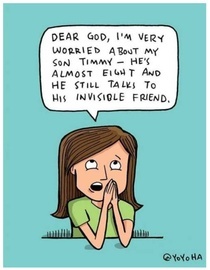Enjoy being online again!
Welcome to the community of good people who base their values on evidence and appreciate civil discourse - the social network you will enjoy.Create your free account
2 comments
Feel free to reply to any comment by clicking the "Reply" button.It has been theorized that children with imaginary friends may develop language skills and retain knowledge faster than children without them, which may be because these children get more linguistic practice than their peers as a result of carrying out "conversations" with their imaginary friends.[11] wikipedia
[en.m.wikipedia.org]
Enjoy being online again!
Welcome to the community of good people who base their values on evidence and appreciate civil discourse - the social network you will enjoy.Create your free account
Share this post
Related Groups More
Memes R Us
3036 members
Categories
Agnostic does not evaluate or guarantee the accuracy of any content. Read full disclaimer.








